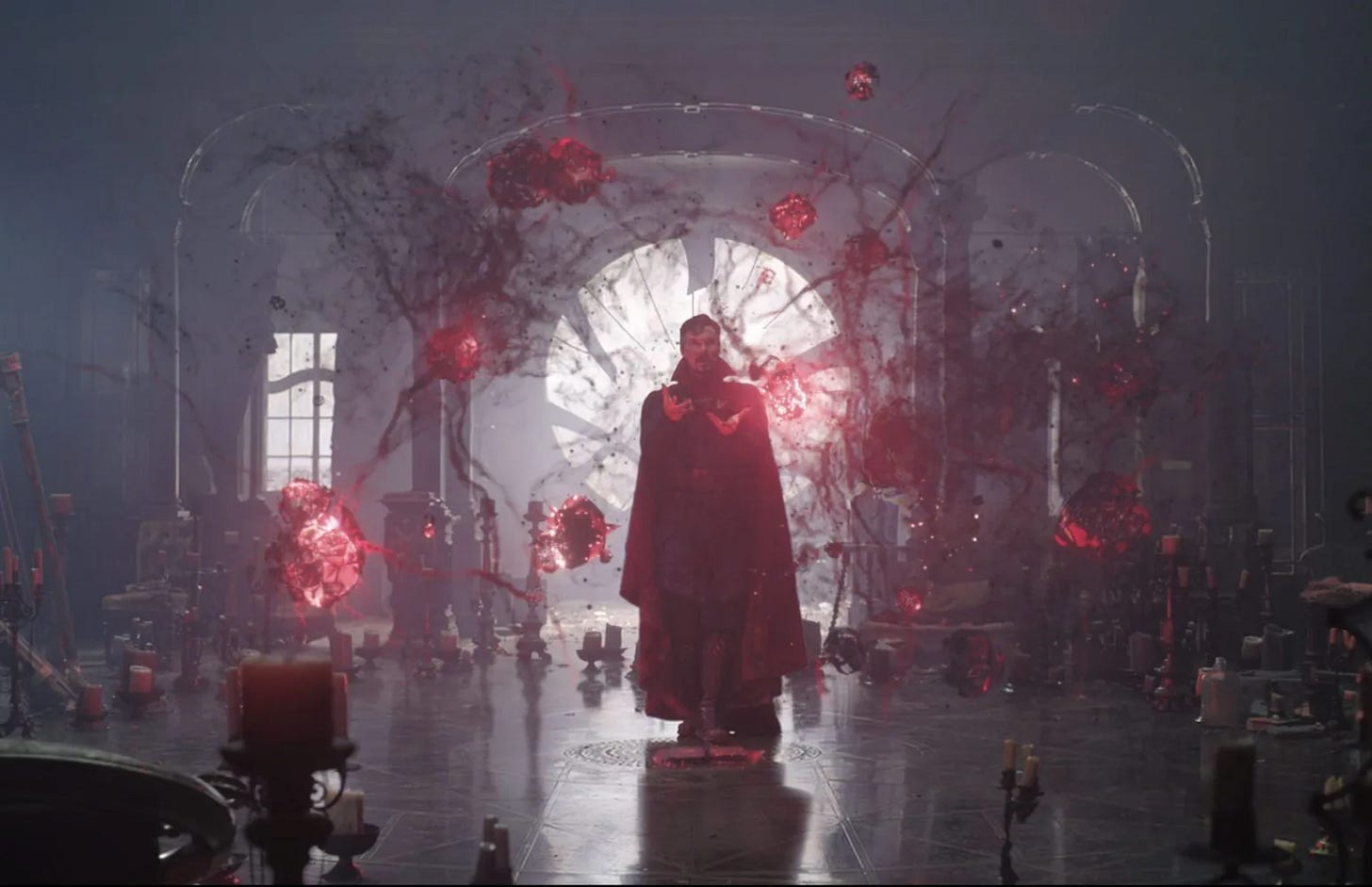This is the first essay in a series called Speculating on Fiction, in which we tackle big works of speculative fiction, thinking about their imagined worlds, their impact on characters and story, and what all of it is saying.
This week, to go along with The Novel Tea’s episode about Sea of Tranquility, Neha explores the concept of multiverses, spin-offs, and parallel universes. This essay contains only minor concept spoilers (no major plot or character spoilers) which we hope will enhance your reading if you haven’t yet picked up the book.
In Robert Frost’s poem The Road Not Taken, he says,
Two roads diverged in a yellow wood,
And sorry I could not travel both
I don’t think Robert Frost knew the power of the multiverse.
In 2024, multiverses dominate the majority of media and pop culture. Since the Marvel Cinematic Universe introduced the concept of a multiverse to me in Avengers: End Game (2019), it’s been something that I have personally developed an interest in in almost all films and literature I consume. My excitement about this idea was definitely propelled forward after Spiderman: No Way Home (2021), Doctor Strange in the Multiverse of Madness (2022), and Loki (2021), but it’s not just Marvel that has the multiverse concept in a chokehold. More recently, Everything Everywhere All at Once (2022) won many film awards, and Dark Matter (2024), an Apple TV series based on the book Dark Matter by Blake Crouch, has been one of my recent weekend binges.
On Season 3 of The Novel Tea podcast, we discussed Sea of Tranquility by Emily St. John Mandel as part of our “Other Worlds” theme. Sea of Tranquility follows the story of multiple characters through different timelines and dabbles in various sci-fi subgenres like time travel, post-apocalyptic worlds, and plague. While discussing this book for the podcast, Shruti and I found out that the characters in the book referenced characters from other novels by Emily St. John Mandel, and so, of course, I immediately proceeded to read Station Eleven and The Glass Hotel.
Though it is unclear if the repeating characters in these books are living in different circumstances in an alternate universe or are a part of the same universe at different points in time. We never get the full picture of the characters mentioned to understand their potential different outcomes, but, in either case, I would still put it under the umbrella category of a multiverse.
The example of focusing on different characters within the same universe is also something I have seen often in films recently. The Mandalorian, for example, is a part of the Star Wars universe we all know and love, but it focuses on a new idea or path with remnants of the original franchise to add an element of nostalgia and excitement. The House of Dragons (from the series Game of Thrones), Rings of Power (from the series Lord of the Rings), and Gen V (from The Boys on Amazon Prime) are some trendy ones these past few years.
In the multiverse that Emily St. John Mandel creates, the connections between characters are subtle and don’t shape the stories of each book individually. It honestly feels like a fun nod to her fans, or an easter egg Mandel may be planting for her own entertainment. If you do get around to reading her novels, you’ll see that the books start to have conversations with each other in an intriguing way.
In The New Yorker article called The Rewriting of Emily St. John Mandel in 2022, Katy Waldman says the following:
“When you start a novel, it’s really open, but then you’re forced to make choices,” Mandel said. “And there’s an ever-narrowing path to the inevitable ending.” If an artist’s job is to make choices, the reader’s job is to bear witness to those choices—to receive them, temporarily, as truth. This amounts to a kind of contract. In return for granting authority to the author, the reader gains pleasure and an ability to form expectations based on what she reads. But Mandel—with her flexible plots, which spin out intricate counterlives and permutations—unsettles this arrangement. She weaponizes her doubt, or strategically deploys it, to break a fundamental rule: Maybe things didn’t happen as I said. The new contract offers the reader a different pleasure, and it confers on Mandel a kind of creative double-jointedness–the ability to twist in two directions at once.
In Sea of Tranquility, one of the main characters, Mirella, is searching for her long-lost friend, Vincent. We get a brief background on Mirella and learn that her husband, Faisal, invested in Vincent’s husband’s fraudulent fund and ultimately took his own life. Her past tells us that she was angry with Vincent for years after the tragedy and partially blamed her for letting this happen, but ends up searching for her to reconnect. Through this search, she finds Vincent’s brother, a music and video artist, and showcases a famous piece that includes a home video of Vincent in Caiette, where a strange glitch occurs. This glitch takes on the main story of Sea of Tranquility.
In The Glass Hotel, Mirella and Vincent are best friends before Vincent’s husband, Jonathan, is arrested for his Ponzi scheme. Mirella and Vincent meet while working at the Hotel Caiette, a luxury hotel on Vancouver Island. Faisal and Jonathan are also good friends, and Faisal invests heavily in Jonathan’s funds before he is exposed and sent to prison. Through Vincent and Jonathon’s perspective throughout The Glass Hotel, we hear the financial strain that Mirella and Faisal have to suffer due to this scam, and when Faisal takes his own life, Jonathon is haunted by him and his mistakes.
Station Eleven, as a genre, takes on a nostalgic role in Sea of Tranquility. Station Eleven is a story about a pandemic where a deadly virus takes over the world and kills 99.99% of the population. Twenty years later, a group of traveling musicians and actors brings joy to small cities across the country. However, through their journey, they notice violence, fear, and the spread of ideas by a mysterious person called the Prophet.
Olive is another key character in Sea of Tranquility, and she is the author of a successful book about a pandemic. While on a book tour to promote her latest success, the world she is living in is showing signs of a deadly sickness about to break out. I think Mandel might have been inserting herself into Sea of Tranquility because she wrote Station Eleven in 2014 before the COVID-19 pandemic broke out and probably received similar questions from her fans at the time. On top of this, there are subtle connections to Station Eleven and The Glass Hotel with the return of a minor character named Leon Prevant and his shipping company Neptune Logistics.
Personally, I think multiverses, parallel universes, or alternate timelines are entertaining. Granted, I do agree that the concept is starting to become a little saturated and feels lazy at times, but especially in a world where you have put in a lot of effort to understand the map of Westeros and the Targaryen family tree to enrich your experience, having new stories that branch off the ones that you are already familiar with is like unlocking a whole new level of a game you finished years ago. In the Mandel Universe, I have not yet picked up Lola Quartet, which is where the Ponzi scheme we hear about in The Glass Hotel and Sea of Tranquility is first mentioned, and even though the book is about an entirely different character with different themes, because of this small connection, it makes me want to read the book more.







The connections are one of the things that really drew me into ESJM's stories. I enjoyed this deep dive!
The whole Mirella-Vincent-Paul thing in The Sea of Tranquility is so cool. David Mitchell also does this to this books.